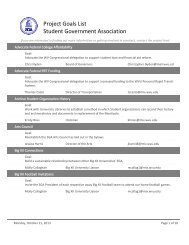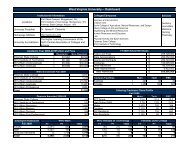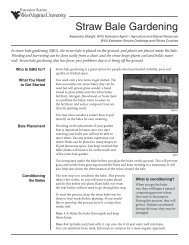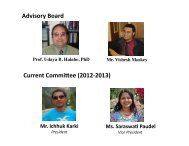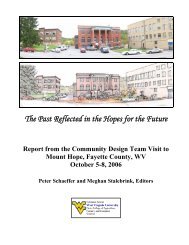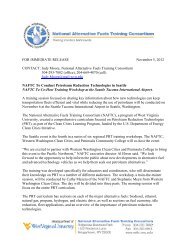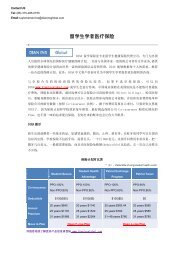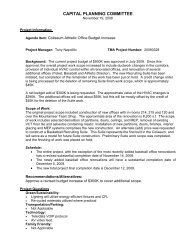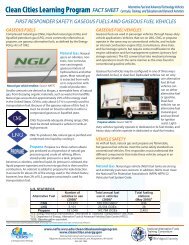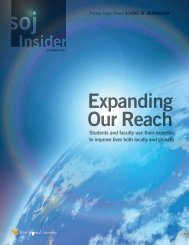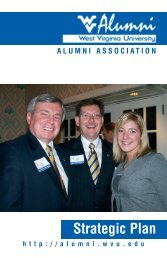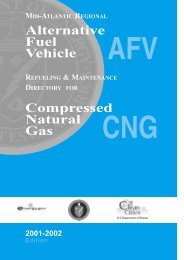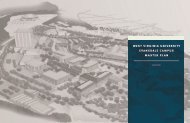The Eberly College Magazine, Spring 2008 - West Virginia University
The Eberly College Magazine, Spring 2008 - West Virginia University
The Eberly College Magazine, Spring 2008 - West Virginia University
Create successful ePaper yourself
Turn your PDF publications into a flip-book with our unique Google optimized e-Paper software.
Dispatches from the Diaspora<br />
Preserving the Past<br />
by Glenn V. Longacre, III<br />
My earliest memories of <strong>West</strong> <strong>Virginia</strong> <strong>University</strong> come from my<br />
father. Dad attended WVU in the late 1940s. He was a Sigma Chi<br />
and graduated with a forestry degree. When I was young, Dad<br />
would take me to see football games played in the downtown<br />
campus stadium, or tell me stories about seeing Don Knotts on<br />
campus.<br />
When I arrived in Morgantown in 1983, I planned to follow in my<br />
father’s footsteps and enroll in WVU’s forestry program. I soon<br />
discovered that while my father’s career was the right fit for him, it<br />
was not the future I was seeking. After growing up in a state born<br />
during the Civil War, serving in the military, and visiting historic<br />
sites at home and abroad, I had developed a fondness for history<br />
that soon redirected my efforts towards the <strong>University</strong>’s<br />
downtown campus.<br />
After a few years roaming Woodburn Hall, I ran into a littleknown<br />
program still in its infancy within the History<br />
Department. <strong>The</strong> public history program was primarily led by<br />
professors Barbara Howe and Emory Kemp, two already successful<br />
scholars who saw great potential in this new field of study. As I<br />
witnessed later in my career, Barb and Emory developed a<br />
national reputation for WVU’s public history program. It was not<br />
uncommon to meet students enrolled in similar programs around<br />
the country who looked to WVU as an academic leader in the<br />
field.<br />
Public history offered prospective students an opportunity to<br />
experience what was informally referred to as “hands-on” history.<br />
To me this was a fascinating opportunity to make a real difference<br />
within the history field. It combined the traditional forms of<br />
historical research and writing with an emphasis on practical<br />
work with tangible results.<br />
<strong>The</strong> program offered unique courses such as historic site<br />
management and interpretation, documentary editing, archival<br />
management, and oral history to name a few. While there were<br />
always classes to attend in Woodburn Hall, many of the skills<br />
introduced in the classroom were later refined and applied in a<br />
practical environment outside of classroom confines. <strong>The</strong> end<br />
Arts & Sciences | 28 | <strong>Spring</strong> <strong>2008</strong><br />
result could be anything from a site management plan intended<br />
for one of the state’s historic sites, a pamphlet on the state’s<br />
covered bridges, working in an archive, or developing an oral<br />
history project for a historical organization. <strong>The</strong> skills that I<br />
acquired through WVU’s public history program are as relevant<br />
today as when I was first introduced to them more than twenty<br />
years ago. I was pleased to learn that the program continues in<br />
the Department of History.<br />
Following graduation from the public history program, I landed<br />
an archivist position with the Ohio Historical Society in<br />
Columbus. After spending four years in Ohio, I saw an<br />
opportunity to work for the National Archives and Records<br />
Administration-Great Lakes Region in Chicago.<br />
It wasn’t long after I began working for the National Archives-<br />
Great Lakes Region that I discovered one of the little-known<br />
treasures of that austere agency. It wasn’t the Ark of the Covenant<br />
as in the Indiana Jones film, but the agency’s regional archives<br />
system. <strong>The</strong> National Archives not only has its main buildings in<br />
downtown Washington, DC. and <strong>College</strong> Park, Maryland, but the<br />
agency also maintains a number of regional archives around the<br />
country whose holdings are just as significant and unique as those<br />
found in Washington, DC.<br />
<strong>The</strong> Great Lakes Region in Chicago holds the historically-valuable<br />
records of the U. S. Government for the six-state area of Illinois,<br />
Indiana, Michigan, Minnesota, Ohio, and Wisconsin. Some of our<br />
more significant holdings include gangster Al Capone’s tax<br />
evasion case file, court cases argued by an up-and-coming young<br />
lawyer named Abraham Lincoln, a June 1918 Canton, Ohio,<br />
speech that landed Socialist Eugene V. Debs in prison for sedition,<br />
and comedian Bob Hope’s naturalization record. Attention <strong>West</strong><br />
<strong>Virginia</strong> historians! <strong>The</strong> National Archives-Mid Atlantic Region<br />
in Philadelphia holds many historical federal records for the<br />
Mountain State.<br />
Like many alums, I still follow with interest the comings and<br />
goings of my favorite <strong>University</strong>. While activities on the gridiron<br />
and basketball court seem to grab national headlines, I too, enjoy<br />
receiving the various <strong>College</strong> and Department newsletters that<br />
allow me to catch up on academic news. It’s particularly<br />
gratifying to see WVU’s new professorship in Civil War studies.<br />
Under Professor Peter Carmichael’s solid guidance, the program<br />
will gain a national reputation and attract promising 19th-<br />
Century historians and scholars to Morgantown.<br />
<strong>West</strong> <strong>Virginia</strong> <strong>University</strong> alumni, students, faculty, and staff are<br />
part of a proud tradition that grows stronger each day.<br />
Let’s go, Mountaineers!<br />
Dispatches from the Diaspora is written by WVU alumni who are living outside<br />
the boundaries of <strong>West</strong> <strong>Virginia</strong>, but who remain committed to WVU and the<br />
<strong>Eberly</strong> <strong>College</strong> and find creative and thoughtful ways to stay connected.



